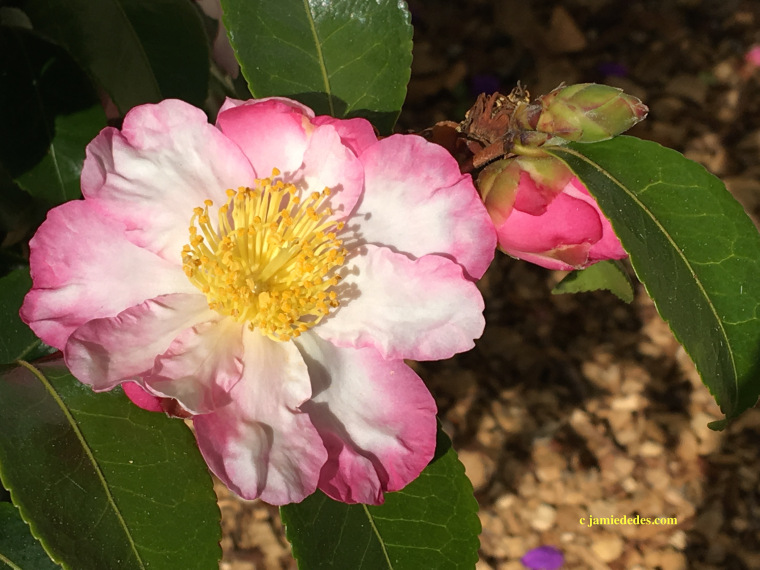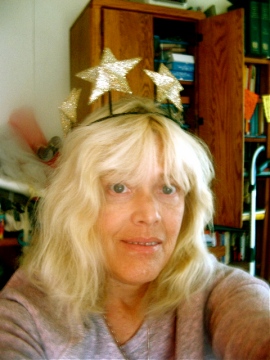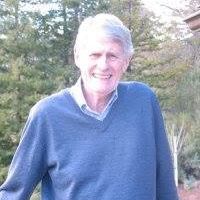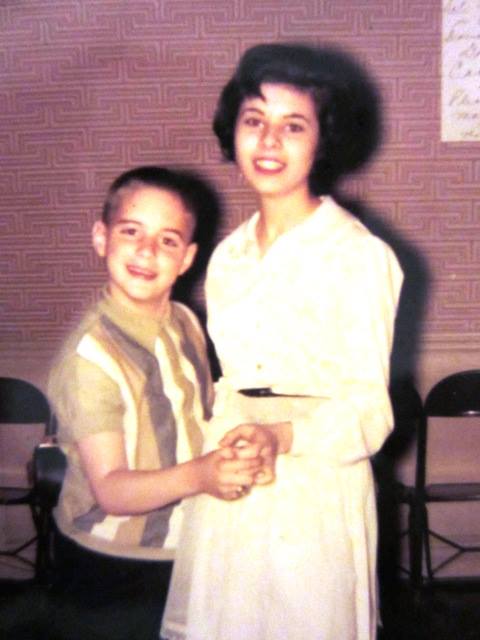
One Lifetime After Another
one day, you’ll see, i’ll come back to hobnob
with ravens, to fly with the crows at the moment
of apple blossoms and the scent of magnolia ~
look for me winging among the white geese
in their practical formation, migrating to be here,
to keep house for you by the river …
i’ll be home in time for the bees in their slow heavy
search for nectar, when the grass unfurls, nib tipped ~
you’ll sense me as soft and fresh as a rose,
as gentle as a breeze of butterfly wings . . .
i’ll return to honor daisies in the depths of innocence,
i’ll be the raindrops rising dew-like on your brow ~
you’ll see me sliding happily down a comely jacaranda,
as feral as the wind circling the crape myrtle, you’ll
find me waiting, a small gray dove in the dovecot,
loving you, one lifetime after another.
– Jamie Dedes
I was diagnosed with interstitial lung disease twenty-one years ago. I was given two years to live. Thanks to loving family support and excellent state-of-the-art medical care, I’m still alive and kicking. As the disease continues its progression, however, my activities have become increasing constrained. Over the past two years I’ve slowed down dramatically. I am holding the Zine back from fulfilling its wide promise. I find it hard to keep up with obligations and to honor my own ambitions and the prodigious talents and boundless ideas of my colleagues. The long-standing lung issues have evolved into respiratory and heart failure. Other challenges to productivity have popped their disconcerting heads. These include pulmonary hypertension and a rare blood cancer, uncurable but manageable. There is, however, good news.
I’ve had years none of us expected I’d have, years to enjoy my family, my friends, lots of music, reading and writing. I got to see my world-class son married. I’ve been able to spend time getting to know my beautiful multi-talented daughter-in-law and to visit with my cousin Dan when he came home to the States after years of living abroad. Daniel (now Fr. Daniel S. Sormani, C.S.Sp) and I grew up together. He is more like a brother to me than a cousin. Ultimately, I had the pleasure of forming an arts for peace community.
I began blogging in 2008 (The Poet by Day) and in 2011 I founded Into the Bardo with San Francisco Bay Area Poet Ann Emerson and Rob Rossel, a therapist and nature writer. Ann had a rare bone cancer and Rob faced cardiovascular problems. Our intention was to chronical living with dying. My friends preceded me into the bardo after just three years. I had to ponder what to do next.
The Original Zine Team Partners
This post is dedicated to them.


I decided to broaden the scope of the blog, to create a platform for the global expression of peaceable minds, diverse perspectives and cultural understanding. This was a conscious effort to create a virtual space where we could find the commonalities across borders and learn that our differences are so often benign, not threatening. I found talented high-minded folks and a team slowly emerged. We grew from three members to twelve and a subscription base of a few hundred to one that is over 20,000.
We expanded our outreach joining with Washington State Methodist Minister, the Rev. Terri Stewart, and Beguine Again, our sister site. We became a larger presence via Twitter (thanks to Terri Stewart), a Facebook Page (The Bardo Group Bequines), and two Facebook Groups: The BeZine 100TPC (that is, 100,000 Poets and Friends for Change) and The BeZine Arts and Humanities Page. The idea behind the former is to share good news, the “best practices” that are happening all over the world and can be inspiration for initiatives in other areas. The idea behind the arts and humanities page is to give people a place to share the wide range of arts we all engage with or practice and to underscore the fact that “The BeZine” is not just or even primarily a poetry site. We welcome and encourage all types of creative expression.
I have led this effort since 2011 as manager, editor, and recruiter, but it is now time for me to bequeath this grace-filled platform into the hands of the rest of The Zine Team. Some of the support we get from team-members is quiet. You may not be aware of these stalwart and mostly behind-the-scene visionaries. Hence here is a list of the Zine team members.
John Anstie
Naomi Baltuck
Anjum Wasim Dar
Michael Dickel (Now Managing Editor, 100TPC Master of Ceremonies)
Priscilla Gallaso (has moved on but not until after making significant contributions)
Ruth Jewel
Chrysty Darby Hendrick
Joseph Hesch
Charles W. Martin
Lana Phillips
Corina Ravenscraft
Terri Stewart (Cloaked Monk, Zine Canoness, Beguine Again founder)
Kella Hanna Wayne
Michael Watson
WHAT WOULD HAVE BEEN MY NEXT SUGGESTED BIG EFFORT?: The BeZine Educational Blog-Radio Shows:
- Team-member Naomi Baltuck is our resident storyteller and also works for LBGTQ understanding and rights. She’d be the perfect person to do a show and introduce other storytellers to our audience and perhaps provide guidance and encouragement for those whose ambitions include this art.
- Team-member and the Zine’s Canoness, the Rev. Terri Stewart, initiated and runs a program for incarcerated youth. She could bring more information to us on these children and perhaps encourage the start-up of other efforts elsewhere in the U.S. and wherever in the world youth incarceration needs addressing.
- Team-member John Anstie is a singer and poet. Music is important to him. He works with the Sheffield Music Hub as a volunteer. He’s a bass singer in Fox Valley Voices and Hallmark of Harmony. If he was amenable to the idea, I’d like to see him bring together a small panel of musicians and composers to discuss the place of music in our lives.
- Corina Ravenscraft works in several areas that engage, but animal rights is certainly of key importance as is art as avocation. If willing, she’d do beautifully with a couple such shows. (By the way, Corina’s running the Zine banner art contest this year. Check it out. Info HERE. Cash awards.)
- Michael Dickel, a poet, writer, artist and educator teaches English and poetry. I’d love to see him do a show on poetry writing, especially one providing youth guidance.
- There are so many people for whom English is not a first language but who love writing in English. Anjum Wasim Dar is the perfect person to interview and discuss the rewards and challenges of such should she choose to do so. Many of the Zine’s contributing writers have this in common with her.
- Who better than Mbizo Chirasha to draw together other writers and poets for a discussion of the new colonialism of Africa?
- And who better to handle a panel discussion on surviving life with disabilities and chronic illness than Kella Hanna-Wayne?
- Many of our contributors run organizations that are working for the good in their communities: clothing closets, food banks, soup kitchens, after-school programs, boys-and-girls club activities and on and on. So much good is being done.
And how about a Zine anthology? The sales might help with the maintenance of this site and its activities as well as promoting and acknowledging our talented contributors.
I’d have loved to be involved in helping to bring such work to the fore. What do you think? Share your thoughts and preferences in the comments section below. Enthusiasm is encouragement. Maybe the team will decide to move forward on these ideas. It’s up to them, of course. They probably have some other and better ideas themselves. One way or another, whatever The Zine Team decides to do, it will be magnificent. Guaranteed.
With love from the edge of eternity,
Jamie Dedes
The BeZine Founding Editor, Editor Emerita
















 watercolor 11/2019
watercolor 11/2019 
 watercolor 2018
watercolor 2018 
